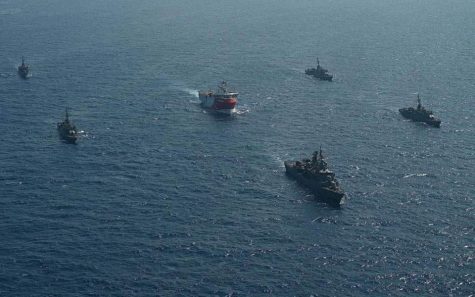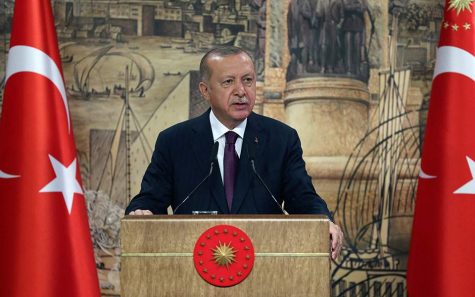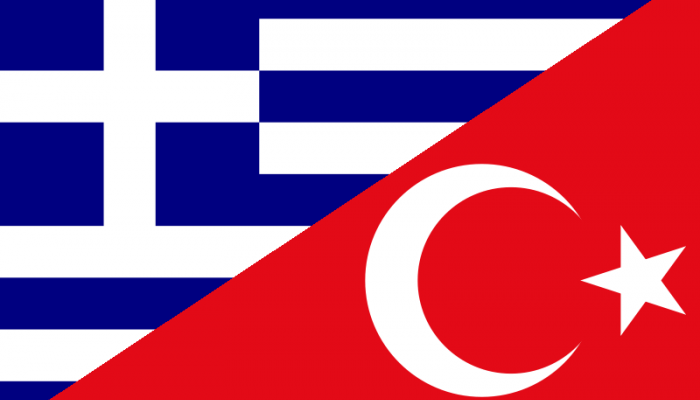Greece and Turkey: A Summary of Recent Tensions, from a Greek Perspective
The flag of Greece and of Turkey.
September 17, 2020
Tensions between Greece and Turkey have escalated in the past month due to a confrontation in the Mediterranean Sea over oil deposits. Now, Europe braces in hopes that diplomacy will win over force.
According to an article by BBC News, Greece and Turkey have had conflicting claims over territories in the Mediterranean Sea for a while. In July, Turkey had sent an alert that they would look for these gas deposits near the island, Cyprus, and other islands, raising alarm in Greece. By that point, the intervention of Germany assured talks to take place, easing the situation for the time being. However, this peace did not last long. Turkey was angered after Greece signed a deal with Egypt over extending Greece’s border by 12 nautical miles, as stated by an article from Al Jazeera.
“In the Aegean, Greece cannot extend its borders to 12 miles,” Mevlüt Çavuşoğlu, the Minister of Foreign Affairs of Turkey said, “This is a cause of war (casus belli).”
On Aug. 10, a Turkish vessel called the Oruc Reis left port to travel between Crete and Cyprus, accompanied by Turkish Navy ships and tracked by Greek Navy ships. Two days later a Turkish warship collided with a Greek ship.

Since this collision, the European Union has gotten involved, backing Greece and Cyprus in the conflict and creating a list of sanctions against Turkey if the situation does not calm down.
“The EU was very clear in its solidarity with Greece and Cyprus and very clear as to what it expects from Turkey so that we can defuse and de-escalate the situation,” Peter Santo, European Union foreign policy spokesman said according to an ekathimerini.com article, “We hope our Turkish friends and partners will take this into account and start to act accordingly so that we don’t have to follow the alternative path of restrictive measures…”
However, not everyone thinks that the EU’s warnings to Turkey will help the situation.
“…the EU seems to fall short, in particular concerning the dynamics of Turkey-EU relations,” a report from the Daily Sabah said.
Others seem to agree.
“So far the EU’s actions have rather confused than helped the situation and same goes for NATO,” Dimitris Anagnostou, a citizen and resident of Greece said, “On September 24-25 the EU will decide the sanctions against Turkey and so far Turkey doesn’t seem to take the warning seriously.”
But none of this conflict between Greece and Turkey is new, in fact, it has lasted for centuries according to an article by The New York Times.
“Growing up in Greece as a kid I always thought how unfortunate we are having Turkey as our neighbor,” Anagnostou said, “‘Why not Norway, Switzerland or France? Why Turkey?’ A war loving nation that historically took advantage of weakened neighbors expanding and establishing itself as an empire, the Ottoman Empire. Greece remained under Turkish rule for 400 years”
Just a couple examples of the recent quarrels between these long time rivals include Turkish president, Recep Tayyip Erdoğan, deciding to turn the Hagia Sophia, an originally Orthodox Christian church and large symbol for the Greek Orthodox community in general, from a museum into a mosque, a move that created an outcry from Greece and other nations, and statements of defense from Turkey of their decision, according to an article by The Media Line.
Last spring, during the Friday of Holy Week for Orthodox Christians, a time largely important to Greece’s culture and religion, Turkey sent F-16 fighter jets into Greek airspace 48 times, as reported by an article from Greek City Times.
These actions and many more have led the people of Greece to be very upset with the Turkish president.

“I am somewhat worried as we have to deal with a very unpredictable Turkish President that has eliminated any political opposition in his country by imprisoning thousands of people, politicians, journalists, military officers etc.,” Anagnostou said,
“He has led Turkey into a serious economic crisis, is involved in military action in Syria and Libya and is trying to find ways to remain in power.”
But why does all of this pressure between Greece and Turkey matter? Why does it bring about so much concern? This is because Turkey has already made threats of war, and the situation does not seem to have calmed down since.
“We live in a tangled world and this tension is not only between Greece and Turkey,” Mr. Anagnostou said, “The Greek borders are also European Union borders and same for the Greek Natural Resources. Greece and Turkey are also NATO ‘allies’. This means that a possible mistake might bring the mega powers at a face off.”
So will this conflict bring about war in Europe in the near future? It looks like the world will have to wait and see.
Sources:
https://www.bbc.com/news/world-europe-53497741
https://www.aljazeera.com/news/2020/08/east-med-greece-ratifies-deal-egypt-turkey-hold-drills-200827172121575.html
https://www.dailysabah.com/opinion/op-ed/eu-not-a-credible-mediator-in-turkish-greek-confrontation
https://themedialine.org/by-region/hagia-sophia-museam-to-mosque-conversion-draws-range-of-reactions/

